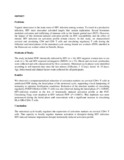| dc.description.abstract | Problem:
Vaginal intercourse is the main route of HIV infection among women. To result in a productive infection, HIV must encounter activated targets that sustain replication. Sexual hormones modulate activation and trafficking of immune cells to the female genital tract (FGT). However, the impact of this hormone-induced activation profile on HIV susceptibility and the effect of chronic HIV infection on activation profile remain elusive. In this study, we characterized cervical and circulating CD4 and CD8 T cells and circulating regulatory T cells during the follicular and luteal phases of the menstrual cycle among female sex workers (FSW) enrolled in the Pumwani sex worker cohort in Nairobi, Kenya.
Methods of Study:
The study included FSW chronically infected by HIV (n = 16), HIV-negative women new to sex work (n = 36) and HIV-exposed seronegative (HESN) (n = 33). Blood and cervical cytobrushes were collected and cells characterized by flow cytometry. Menstrual cycle phases were identified according to self-reported date since the last menses (follicular: 3–12 days, luteal: 16–35 days). Age, behavioural and clinical factors were collected for all participants.
Results:
We observed a compartmentalized reduction of activation markers on cervical CD4+ T cells in uninfected FSW during the luteal phase of the menstrual cycle, supporting a local dampening of immunity to optimize fertilization conditions. Reduction of the absolute number of circulating regulatory FOXP3+Helios+CD4+ T cells was also observed during the luteal phase (P = 0.0049). HIV-infection resulted in the lost of hormonally induced activation profile at the FGT. Circulating Tregs were depleted in HIV infected FSW (P = 0.0051). This depletion was more pronounced during the luteal phase and concomitant with a significant increase in circulating HLA-DR+CD8+ T cells.
Conclusion:
The menstrual cycle locally regulates the expression of activation markers on cervical CD4+ T cells. This capacity to locally regulate immune activation is disrupted during HIV infection. HIV-induced immune impairment disrupts hormonally induced activation profile. | en_US |

